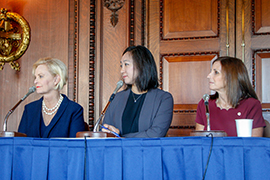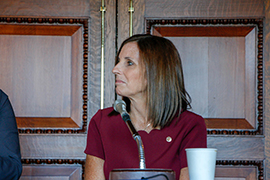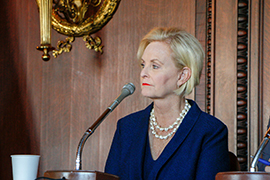- Slug: BC-CNS-Traffic Stop,560
- 3 photos available (thumbnails, captions below)
By Megan U. Boyanton
Cronkite News
WASHINGTON – Officials at a forum on human trafficking said Arizona is “leading at the state level” on prevention, but warned that people need to remain vigilant to what one speaker called a trafficking “epidemic” in the state.
The remarks from Sen. Martha McSally, R-Ariz., and Cindy McCain, widow of former Sen. John McCain and member of the Arizona Human Trafficking Council, came at a Thursday event designed to help health care professionals recognize the signs of trafficking.
With its proximity to the border and to other large cities, Arizona is a hot spot for trafficking, state officials say.
“It’s happening in Arizona,” McSally said. “It’s happening in our own communities with those who are vulnerable.”
Experts at the event said there have been strides in the fight against trafficking since 2013, when then-Gov. Jan Brewer established the Governor’s Task Force on Human Trafficking.
That was followed in 2014 by passage of HB 2454, which aimed to squeeze trafficking by increasing penalties for traffickers and adding protections for victims.
Those efforts were continued in 2015 when Gov. Doug Ducey created the Arizona Human Trafficking Council, which focuses on spreading awareness and on prevention through tools like specialized anti-trafficking units. For the last four years, Ducey has proclaimed January Human Trafficking Prevention Month.
“The governor is really active on this issue because he was on the original task force,” said McCain, who has served on both councils.
McCain said much of Arizona’s success relies on joint efforts between police, state agencies and the “compassionate care” of health service workers.
McSally said such cross-collaboration needs to continue because it paves “an easy path for wraparound services for those who are victimized.”
Even so, both agreed that more needs to be done, beginning with removing the stigma around trafficking victims.
“The one word that drives me over the moon is ‘prostitute,'” said McCain, who said those trafficked into it don’t have a choice.
She would like to see education about human trafficking prevention introduced in schools around the state, but said she has faced opposition to the suggestion in the past.
“At the school district level, they could implement it if they wanted to, but it’s confused with sex ed,” McCain said. “So it’s up to us to separate it.”
As new remedies are applied, new challenges have arisen. The top venue for sex trafficking in the state is through internet advertisements, according to a report by the Department of Health and Human Services.
Before adult-services site Backpage.com was seized by the FBI, it posted more than 300 advertisements for sex workers daily in Arizona. The Arizona Attorney General’s Office estimated that 20% of those were for underage girls, and said the average age for girls forced into sex trafficking is 14.
Preteens are in high demand: In July, an undercover operation led to the arrests of 25 men in Arizona for soliciting or purchasing sex with minors.
Last year, the National Human Trafficking Hotline reported 231 cases of human trafficking in Arizona, 12th-highest in the nation. The number has only increased since 2012.
Speakers at the Library of Congress event also included Rep. Roger Marshall, R-Kan., and Katherine Chon, the director of HHS’ Office on Trafficking in Persons, and a co-founder of the Polaris Project, a nonprofit that battles “modern slavery.”
“Arizona is really leading at the state level on this issue,” McSally said at the event.
For more stories from Cronkite News, visit cronkitenews.azpbs.org.
^__=
Web links:
_ Arizona trafficking report: https://www.azag.gov/sites/default/files/publications/2018-06/Human_Trafficking_Not_Buying_It.pdf
_ Brewer task force: https://www.mccaininstitute.org/news/governor-jan-brewer-establishes-human-trafficking-task-force/
_ HHS report: https://www.acf.hhs.gov/sites/default/files/otip/arizona_profile_efforts_to_combat_human_trafficking.pdf
_ Arizona arrest stats: https://humantraffickinghotline.org/states
_ Trafficking sting: https://news3lv.com/news/nation-world/25-arrested-in-child-sex-trafficking-sting-in-arizona
^__=
From left, Cindy McCain, Polaris Project co-founder Katherine Chon and Sen. Martha McSally, R-Ariz., at the event to help health care workers better recognize the signs of human trafficking. (Photo by Megan U. Boyanton/Cronkite News)
Sen. Martha McSally, R-Ariz., said Arizona is at the forefront of the fight against trafficking, but it can’t rest because the crime continues to occur in the state, in person and online. (Photo by Megan U. Boyanton/Cronkite News)
Cindy McCain, widow of the late Sen. John McCain, R-Ariz., has been a member of human trafficking task forces under both Gov. Jan Brewer and Gov. Doug Ducey. She said trafficking is an “epidemic” in the state. (Photo by Megan U. Boyanton/Cronkite News)


